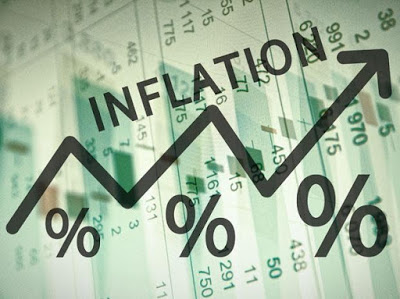Overview: Investors’ mood did not improve over the weekend, and the lack of risk appetites are rippling through the capital markets today. Equities have tumbled, yields have backed off, and the dollar is well bid. Hong Kong and Australia led the sell-off in the Asia Pacific region, off 3.3% and 2.1%, respectively. Regional losses may have been larger, but Japan, Chinese (mainland), and South Korea markets were on holiday. Europe’s Dow Jones Stoxx 600 is off 2%, the most in two months. US futures are pointing to opening losses of 1%+. The carnage is giving the bonds markets a bid. The US 10-year yield is off a couple of basis points, around 1.33%. Europe’s benchmarks are mostly 1-2 bp lower. The dollar is extending last week’s gains against nearly all the major
Topics:
Marc Chandler considers the following as important: 4.) Marc to Market, 4) FX Trends, Australia, Canada, China, Currency Movement, Featured, France, Germany, IMF, newsletter, USD, World Bank
This could be interesting, too:
Nachrichten Ticker - www.finanzen.ch writes Die Performance der Kryptowährungen in KW 9: Das hat sich bei Bitcoin, Ether & Co. getan
Nachrichten Ticker - www.finanzen.ch writes Wer verbirgt sich hinter der Ethereum-Technologie?
Martin Hartmann writes Eine Analyse nach den Lehren von Milton Friedman
Marc Chandler writes March 2025 Monthly

Overview: Investors’ mood did not improve over the weekend, and the lack of risk appetites are rippling through the capital markets today. Equities have tumbled, yields have backed off, and the dollar is well bid. Hong Kong and Australia led the sell-off in the Asia Pacific region, off 3.3% and 2.1%, respectively. Regional losses may have been larger, but Japan, Chinese (mainland), and South Korea markets were on holiday. Europe’s Dow Jones Stoxx 600 is off 2%, the most in two months. US futures are pointing to opening losses of 1%+. The carnage is giving the bonds markets a bid. The US 10-year yield is off a couple of basis points, around 1.33%. Europe’s benchmarks are mostly 1-2 bp lower. The dollar is extending last week’s gains against nearly all the major and emerging market currencies. The yen and the Swiss franc, the other funding currencies, are also firm. The Australian dollar and Scandies are the weakest of the majors, while the Russian ruble holds the dubious distinction among emerging market currencies. The JP Morgan Emerging Market Currency Index is moving lower for the third consecutive session. Gold is not drawing as much support as one might expect from the softer yields and falling equities. It is a little firmer near midday in Europe. Oil’s recent gains are being pared, and the November WTI is off 2.2%, its second day of losses, and is approaching $70. Iron ore has continued to fall, and after falling 4.5% last week, copper is off another 2.6% today.
Asia Pacific
The seemingly slow demise of China’s Evergrande is weighing on sentiment. However, most of the contagion seems limited to the real estate development sector. Sinic, another property developer, collapsed more than 85% today before trading halted. The next key event in the saga may be an Evergrande interest payment due Thursday on two notes, one of which is trading at 30% of face value.
A top Chinese regulator defended Beijing’s actions to a group of Wall Street executives and tried playing down the worrisome implications. First, regulations were strengthened for companies with consumer-facing platforms. Second, data privacy was improved. Third, there were national security gaps that were closed. Fourth, “social anxiety” over education and gaming was addressed. Many investors are unlikely to be persuaded. Even if the one is sympathetic to the ends, the means still rankle investors. It still appears to be the aggrandizement of the state sector and choking the private sector. No rival authority (family, cultural expressions, business) to the CCP is brooked.
This week’s BOJ meeting is not drawing much attention. The domestic focus is on next week’s LDP leadership contest, where Kono is the favorite and a substantial fiscal policy. The yen is being supported by the risk-off mood. After being rebuffed a little above JPY110, the dollar is trading near JPY109.60. A band of support extends to around JPY109.45, but the key is closer to JPY109.00, where an option for nearly $1.1 bln rolls off today. Falling iron ore prices and weaker miners in Australia saw the stock market tumble to three-month lows today, and the Australian dollar’s two-week drop is being extended. It fell to nearly $0.7225 today. A week ago, it was about a cent and a half higher. The next downside target is around $0.7200, and a break could spur a move to the year’s low set in late August near $0.7100. With Chinese mainland markets closed, the yuan did not trade onshore. The offshore yuan fell for the third consecutive session, and around CNH6.4835, the greenback is near a three-week high.
Europe
Irate over the new AUKUS security pact that led to Australia canceling a multibillion-dollar order of a dozen submarines, French President Macron recalled its ambassadors from Washington and Canberra, but not the UK. None of the explanations offered by the US, Australia, or commentators appear to have explained why the French were not offered a subcontract in the new nuclear submarine deal. If the US wanted to create a democratic bulwark against totalitarian regimes, wouldn’t include the EU in the new security arrangement been preferable? Wouldn’t that have been a more powerful signal? Two years ago, Macron warned that NATO was becoming “brain-dead,” and recently, he seemed to reject a more Asian focus of NATO, expressing frustration with the US efforts, noting that the South China Sea was not part of the Northern Atlantic. Either the Biden administration was naïve about the French reaction or did not care about it (it would have limited “real costs”). The deal was the equivalent of one year of France’s current account deficit. The equivalent for the US would be something of the magnitude of $650 bln. Since neither the nuclear subs nor the French subs could be delivered any time soon, the announcement’s importance was the signaling, not Australia’s immediate security needs. Many accounts seem to see this as a strategic issue. They abstract it from the arms race in Asia and fierce competition for arms deals. “Just business, mate,” may not be the best way to strengthen a broad alliance. If Europe is spurred to boost its own military spending, it may be designed to address a threat closer to home and a more significant threat than Beijing: Moscow.
Australia’s Prime Minister Morrison argues that there was a change in the strategic environment since the contract was negotiated in 2016. There have been four significant changes. First, Beijing has become more aggressive in the South China Sea. It bullies and intimidates others in the region. Second, until now, Australia eschewed nuclear power. Reports suggest Australia is not quite sure of what to do with the nuclear waste that the submarines will generate. Australia will be the only country without the nuclear capability to have nuclear-powered subs, and it will also be the smallest of the six (US, China, UK, France, India, Russia). Third, the UK left the EU. If the UK was still in the EU, it might not have been included in the new deal. Yet, the shift in the US from Trump to Biden was maybe the most important of the changes. Securing nuclear-powered subs was not possible when Canberra and France struck the deal. Now it is, and the threat has strengthened. While many observers suggest it is a well-thought-out strategic US move, annoyed with the Chinese Investment Agreement (which seems defunct now), but it may also simply be part of the clumsy foreign policy of the Biden administration. Europe also argued it was not consulted on Afghanistan. Two European foreign ministers (UK and Netherlands) have been replaced over the tragedy. With an election next year, French President Macron has political considerations to deal with as well. France has canceled a defense meeting with the UK, though it has not recalled its ambassador as it has with the US and Australia. There are several unresolved Brexit-related issues in which Paris cannot express its anger.
German heads to the polls next Sunday. The SPD candidate for Chancellor, Scholz, remains the favorite and said that its coalition partners would have to be willing to boost tax on the wealthy and support a 12 euro minimum wage. This may be a negotiating position and posturing to draw support from the left. The outcome will determine whether the centrist FDP is needed. Meanwhile, despite falling public support, Putin’s United Russia won the weekend legislative elections. Cyberattacks in Hungary disrupted Saturday’s primary contest.
The euro is testing $1.17 in late morning turnover in Europe. Recall that the single currency had briefly traded above $1.19 in response to the disappointing US employment data on September 3. A break of $1.1700 targets the year’s low set on August 20 near $1.1665. The more the euro sells off in the first part of the week, the more the “sell the rumor buy the fact” type of activity could be seen after the FOMC meeting concludes Wednesday. Last Monday, sterling reached its highest level in a month (~$1.3915) before reversing lower. It has hardly sustained upticks since then, and today it has approached $1.3660. There is little support now ahead of $1.36. It has not closed below $1.36 since mid-January, though a couple of intraday violations have occurred. The year’s low is near $1.3450. This week’s BOE meeting is not expected to lead to a change in policy, and we suspect the risk is that the tone of Governor Bailey’s comments pushes against the expectations of two hikes next year.
America
On the heels of the tragic ending of America’s longest war and antagonizing France and the EU in a submarine deal, Biden will host an alliance that some consider similar to NATO for Asia: the Quad. It will be an in-person meeting in the US, with Australia, India, and Japan. With another one of its members to have nuclear-powered subs, this Quad meeting may go out of its way to highlight other areas of cooperation, like semiconductor chips, rather than just China. But surely, it’s the fifth person in the room, so to speak. Making supply chains more robust and resilient makes sense, but what part of that supply chain is in Australia or India? A draft of the statement that appeared in the Nikkei business daily reveals the misdirection. The nations will agree to “ascertain their semiconductor supply capacity and identify vulnerabilities.” It is hardly a cooperative undertaking. It is more like parallel play.
The IMF’s Managing Director pushed back against the World Bank’s accusations that she (and an aide who helped implement the Doing Business report for the multilateral lender) pressured staff to boost China’s ranking when the Trump Administration was cutting funding, and China’s resources sought. The rating apparently was raised to 78 from 85, which does not seem material from the outside. Still, it is the second such scandal over the report. Romer, the chief economist, quit in 2018 over changes to Chile’s ranking. It seems clear that there was always some discretion in the qualitative report. The investigation reads like the conclusion was reached first, and then the rationale was provided. World Bank President Malpass was a Trump appointment, and if one were looking for a way to sabotage the multilateral, this could be an effective ploy. It could lead to bad blood between the two and further weaken them both in the face of rising nationalism.
The US debt ceiling is approaching. Treasury Secretary Yellen has repeatedly urged Congress to act. The House may take up a stop-gap measure to extend it, but it faces obstacles in the Senate. The busy US economic calendar with the week begins off slowly. Besides the FOMC meeting, housing data are featured before the preliminary September PMI, which is expected to have softened a little.
Canada goes to the polls today. Prime Minister Trudeau and his Conservative challenger O’Toole appear to be in a dead heat. Still, the distribution of votes suggests the Liberal Party may secure the most seats in parliament. Trudeau does not look like he has improved his position despite the stimulus spending, the vaccine rollout, and the strengthening economy. O’Toole has run a good campaign and moderated the party’s social positions. Many of Trudeau’s campaign promises seemed to be predicated on the Liberals securing a majority. Still, with the support of the New Democratic Party, some of the fiscal measures may be adopted. Unlike other major industrialized countries, this means that the policy mix in Canada next year–tighter monetary policy, looser fiscal policy–is often seen as supportive of the exchange rate.
The sharp drop in equity prices and broad US dollar strength are weighing on the Canadian dollar. The greenback is rising for the third consecutive session. It has pushed above CAD1.28 to reach its highest level since August 20, when the US dollar’s high of the year was recorded (~CAD1.2950). There is an option for $360 mln at $1.2900 that expires today. Note that the US dollar is well above the upper Bollinger Band (~CAD1.2790). The sapped risk-appetites are also taking a toll on the Mexican peso. The dollar carved out a solid base in the first part of September around MXN19.85. The three-day rally has lifted the greenback to MXN20.1365 today, its highest level this month. A move above MXN20.14 targets the MXN20.2050 area. The dollar is poised to extend its recent gains against the Brazilian real, and the next target is BRL5.40.
Tags: #USD,Australia,Canada,China,Currency Movement,Featured,France,Germany,IMF,newsletter,World Bank








